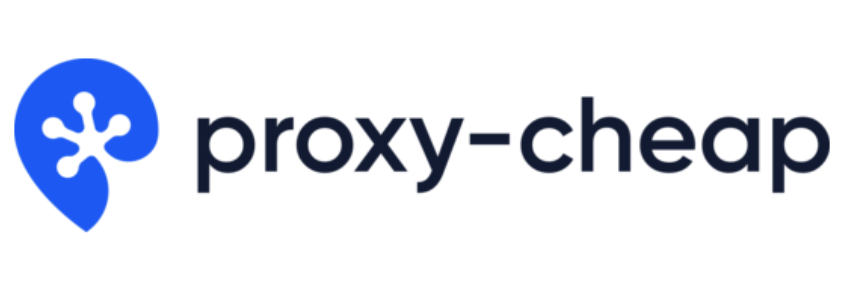
Volver al hub
Software
Prospección B2B
Blog
The 5 best 4G proxies that won't get you banned in 2025
Publicado el 24 oct 2025Actualizado el 27 oct 2025
Look, let's cut through the noise. You're here because you need 4G proxies that actually work, not some overpriced garbage that gets flagged within minutes. Maybe you're managing multiple social media accounts, scraping data without getting blocked, or just trying to stay anonymous online without websites treating you like a bot.
Here's the thing: 4G mobile proxies have become essential tools for maintaining online privacy and accessing geo-restricted content because unlike datacenter proxies, mobile proxies use IP addresses from mobile devices, making them more reliable and harder to detect. And trust me, that makes all the difference when your business depends on staying under the radar.
But with dozens of providers promising the moon and delivering dial-up speeds, how do you actually choose? I've tested a ridiculous number of these services, and I'm about to save you weeks of trial and error. We're diving into five solid 4G proxy providers that balance performance, pricing, and features, without breaking the bank or your patience.
What Makes 4G Proxies Different from Regular Proxies?
Before we jump into the tools, let's talk about why 4G proxies are in a league of their own.
The Mobile Advantage: Why Websites Trust 4G IPs
Mobile proxies source their IPs from those assigned by mobile carriers, making it appear as though the user is using a mobile device like a mobile phone, tablet, or dongle. This is huge because websites and platforms view mobile traffic as legitimate user activity, not some sketchy bot operation.
Think about it: hundreds of users share the same IP address on mobile networks, making them hardest to block. Websites can't just ban a mobile IP without potentially blocking thousands of real users. That's your golden ticket to avoiding those annoying blocks and bans.
Speed, Latency, and Why 5G Isn't Always Better
Now, you might be wondering: "Should I go with 4G or 5G proxies?" Here's the reality, 5G proxies offer the fastest speeds and lowest latency, while 4G and LTE proxies provide high-speed connections suitable for most tasks.
Unless you're running extremely high-volume operations, 4G is more than sufficient and usually more cost-effective. 4G accounted for 60% of all mobile internet traffic in 2022, and 4G networks are common and reliable in most cities internationally. Plus, 4G networks have broader coverage, which means more available IPs and better connection stability.
How 4G Proxies Help You Avoid Detection
The dynamic nature of mobile IPs, together with CGNAT resulting in many mobile users having the same public IP, significantly lowers the chances of a mobile proxy server being blocked by a website. This is the secret sauce that makes 4G proxies so effective for tasks that would get regular proxies banned in minutes.
Top 5 4G Proxy Providers You Should Actually Consider
Alright, let's get to what you came here for. I've handpicked these providers based on real-world performance, not just marketing hype.
1. Proxy-Cheap: The Budget Champion That Doesn't Suck

Best for: Small businesses and individuals who need reliable proxies without selling a kidney
Let me start with the underdog that punches way above its weight class. Proxy-Cheap offers bargain prices for mobile proxy plans, but don't let the name fool you, these aren't bottom-barrel proxies that'll get you banned before lunch.
What Makes Proxy-Cheap Stand Out
Proxy-Cheap mobile proxies offer unlimited bandwidth, unlimited data, and unlimited traffic, with access to a mobile proxy network of 5M+ addresses and dynamic IP rotation between mobile IPs. That's a pretty sweet deal when some competitors charge you per gigabyte like they're rationing water in a drought.
The platform supports both HTTPS and SOCKS5 protocols, which gives you flexibility depending on your use case. Whether you're running social media automation tools or scraping e-commerce data, you've got options.
Pricing That Won't Make You Cry
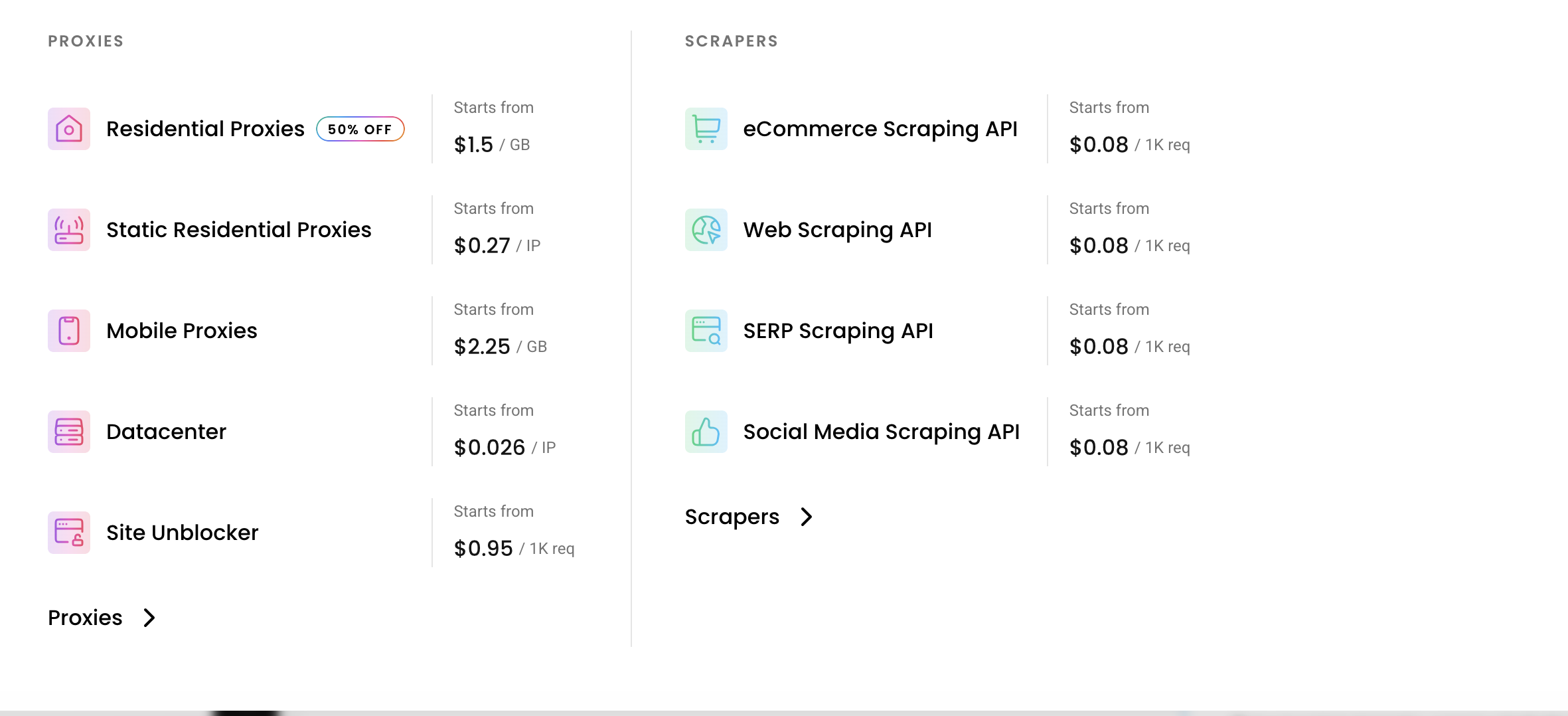
Here's where Proxy-Cheap really shines. Proxy-Cheap offers highly competitive prices with three plans: $50 per month for US mobile proxies, $50–80 per month for EU mobile proxies depending on the selected country, and a $500 per month enterprise plan.
Compare that to enterprise providers charging $500+ for starter plans, and you'll see why I'm recommending them first. While Proxy-Cheap does not have a refund policy, it does provide a free trial option, so you can test the waters before committing.
The Real-World Performance
Proxy-Cheap boasts one of the lowest ban rates in the market and maintains an average uptime of approximately 99%. I've personally used them for managing Instagram accounts and scraping product data, and the connection stability is genuinely impressive for the price point.
Pros:
Unlimited bandwidth (seriously, no hidden caps)
Affordable pricing starting at $50/month
Free trial available to test before buying
5M+ IP addresses across 100+ countries
Low ban rates with 99% uptime
Cons:
No refund policy (but free trial compensates)
Limited to US and EU locations
Customer support could be faster
2. Decodo: The Smart Choice for Global Coverage

Best for: Businesses needing diverse geographic targeting with advanced filtering options
If you need proxies across multiple countries with granular control, Decodo deserves your attention. Since its inception in 2018, Decodo has emerged as a leading provider offering over 10M 3G/4G/5G ethically sourced mobile proxies across 160+ locations and 700+ ASNs.
Performance That Actually Impresses
Here's something you don't see often: Decodo has the fastest response time in the market at less than 0.8 seconds and one of the highest success rates at 99.48%. When you're scraping thousands of pages or managing automation workflows, those milliseconds add up to significant time savings.
Decodo's mobile proxies support SOCKS5 and HTTP(S) protocols and provide OS filtering options for iOS and Android, with an impressive response time of less than 0.8 seconds and a 99.48% success rate. That OS filtering feature is clutch if you need to appear as specific device types for app testing or platform-specific automation.
Advanced Targeting Features
Decodo controls a mobile proxy pool that spans 10 million IPs across more than 160 locations and over 700 ASNs with country-level, ASN, and OS targeting. This level of granularity means you can get hyper-specific with your targeting, down to the mobile carrier and operating system.
Want to test how your app performs for Android users on Verizon in California? Done. Need to scrape localized pricing data from specific regions? Easy.
Cost-Efficiency Without Compromise
The service is cost-efficient compared to major competitors, making it a solid middle-ground option between budget providers and premium enterprise solutions. You're getting near-enterprise features without the eye-watering price tag.
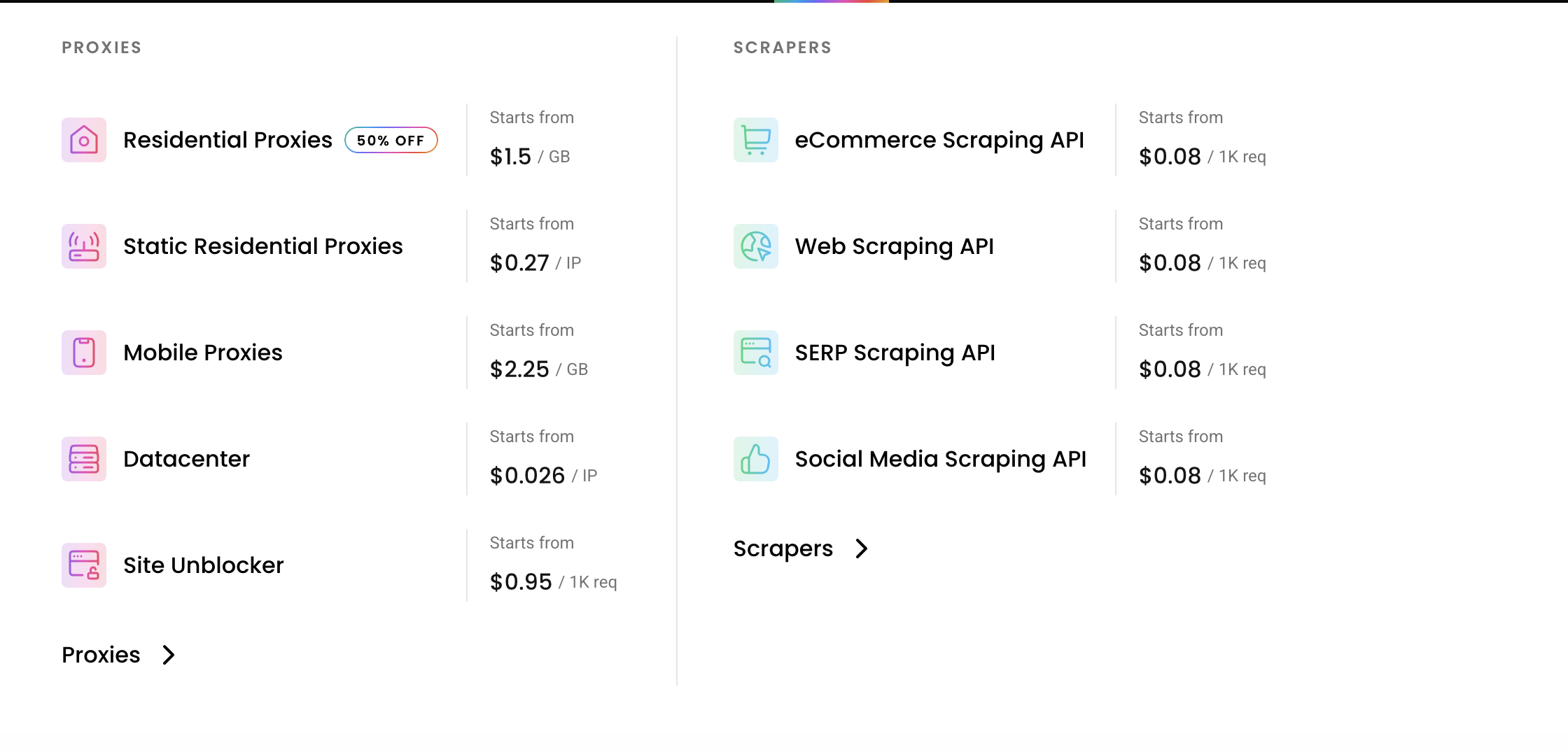
Pros:
10M+ IPs across 160+ locations
Fastest response time (under 0.8s)
99.48% success rate
OS filtering for iOS/Android
700+ ASN targeting options
Ethical IP sourcing
Cons:
Must choose between city targeting and ASN targeting, as they can't be used simultaneously
Steeper learning curve for advanced features
Pricing not as transparent as some competitors
3. TheSocialProxy: The Multi-Account Management Specialist

Best for: Social media managers and marketers running multiple accounts
If your primary goal is managing social media accounts without getting shadowbanned into oblivion, TheSocialProxy is built specifically for you. Designed with automation in mind, TheSocialProxy offers one of the cleanest setups for managing social media accounts securely
Why Social Media Platforms Won't Flag You
The Social Proxy offers high-quality 4G mobile proxies with reliable, unlimited, and feature-full mobile connections, and their vast pool of IPs are used by natural and legitimate users, lowering the risk of websites blocking or banning your device.
This is critical because platforms like Instagram, Facebook, and TikTok have gotten insanely sophisticated at detecting bot behavior. Using IPs that real people actually use on their phones makes your automation look like genuine user activity.
Unlimited Bandwidth for Heavy Users
TheSocialProxy offers unlimited bandwidth, allowing you to run total 4G internet traffic to run as many accounts as you wish, with IP rotation that assists in changing your IP address after every few seconds. The IPs also instantly change upon command, giving you complete control over your rotation strategy.
Simple Pricing, Premium Quality
TheSocialProxy's pricing model is simple: $89 for a 4G proxy port and $119 for a 5G proxy port with discounts on the more ports you purchase, and while these prices may be considered expensive, the benefits and features offered make the investment worthwhile.
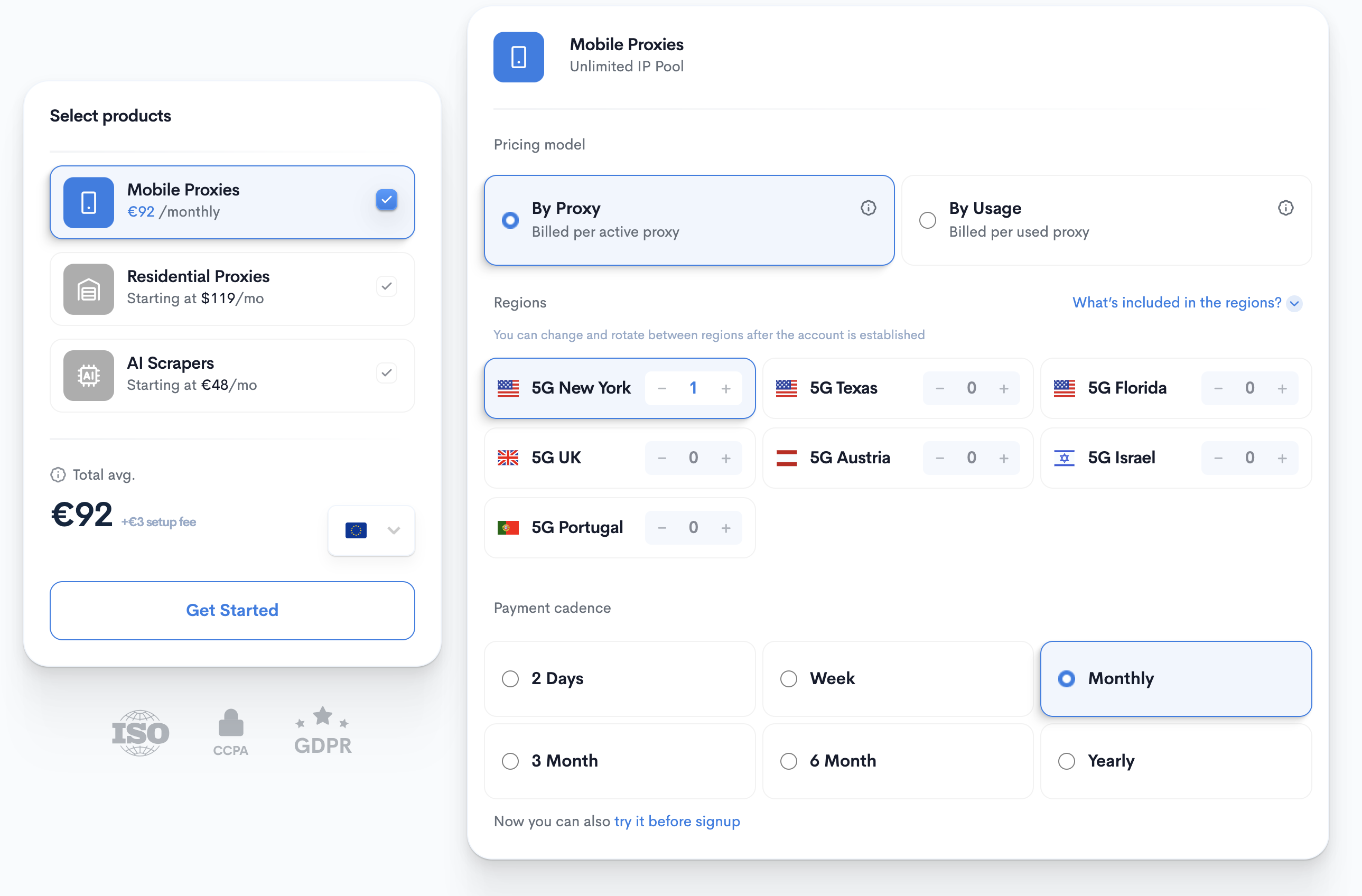
Yes, it's pricier than Proxy-Cheap, but you're paying for specialization. If social media automation is your bread and butter, the reduced ban rate and optimized performance justify the cost. TheSocialProxy also offers a free trial for new users, allowing them to test the service before making a monetary commitment.
Pros:
Optimized specifically for social media platforms
Unlimited bandwidth
Instant IP rotation on command
Raw, unmodified 4G connections
User-friendly dashboard
Free trial available
Cons:
Higher price point ($89-119/month per port)
Limited location diversity compared to larger providers
Overkill if you're not focused on social media
4. AnyIP: The Value Play with Global Reach

Best for: Users needing affordable global coverage with major carriers
Here's another provider that flies under the radar but delivers solid value. AnyIP.io's 5G/4G/3G/LTE proxies are incredibly cost-effective with country-level targeting, and their software gradually manages both 4G and residential proxies for resource efficiency and lower user charges.
Growing IP Pool with Ethical Sourcing
AnyIP's mobile proxy options include 4G, 5G, and LTE addresses with an impressive 99.9% uptime, the pool of mobile proxy IPs grows daily, and they offer only ethically sourced IPs spanning globally from Sprint in the US to India's Reliance Jio operator.
That daily growth is significant, you're not stuck with a stagnant IP pool that websites might start recognizing over time. Fresh IPs mean better success rates and fewer blocks.
Real-World Use Cases
Users testing AnyIP mobile proxies for several months report they worked perfectly well in tasks such as ad verification, accessing priority websites, targeted location activities, and effortless control of 28 social media accounts including Instagram and Twitter proxies. Managing 28 accounts without issues is a pretty solid endorsement.
Pricing That Makes Sense
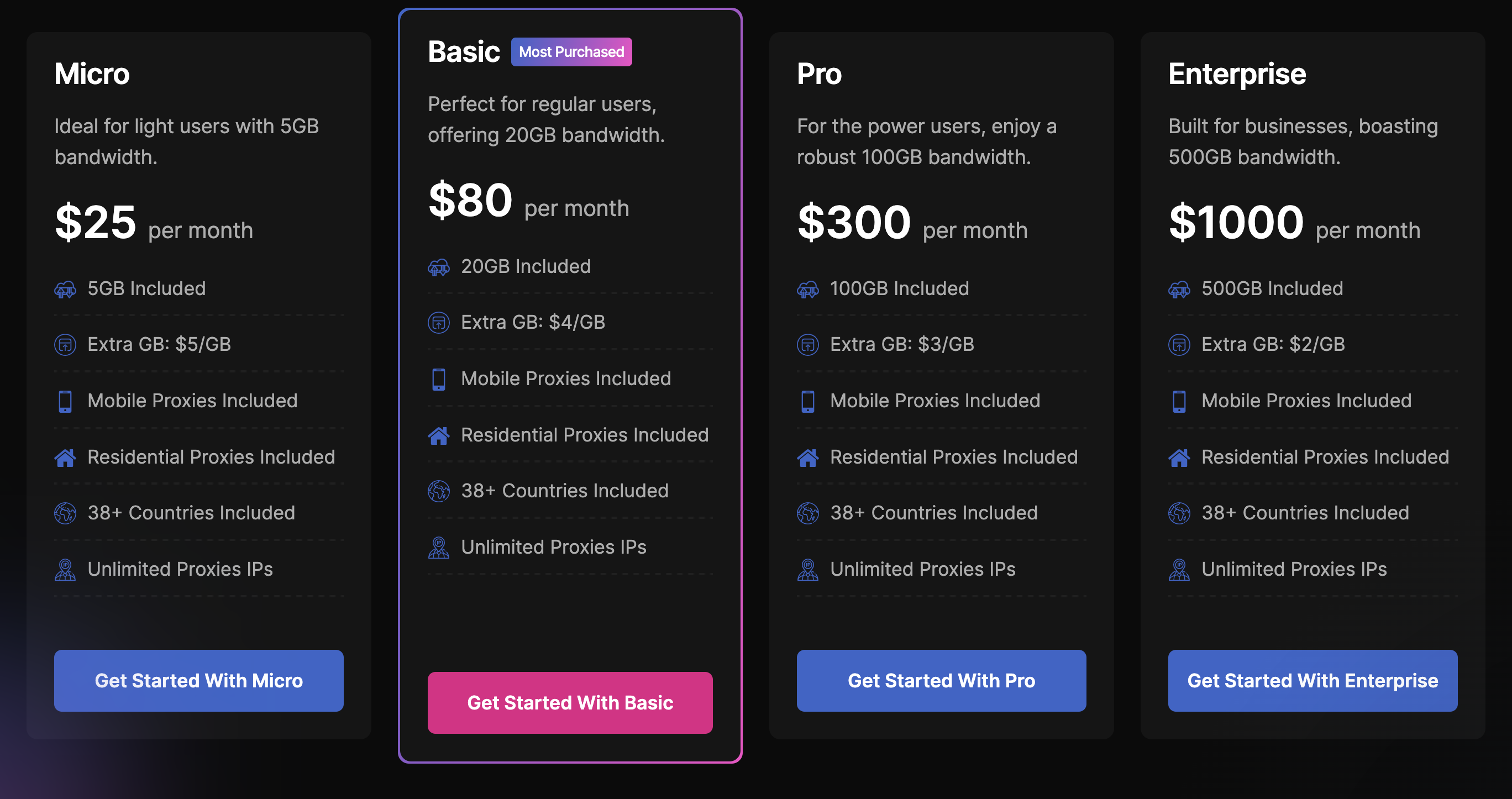
AnyIP provides the cheapest 4G/5G mobile proxies in the industry at from $2 per GB with access to millions of rotating IPs and Sticky IPs. That pay-as-you-go model is perfect if you have variable usage or want to test extensively before committing to larger plans.
Pros:
Starting at $2/GB (highly competitive)
99.9% uptime guarantee
Daily growing IP pool
Ethically sourced from major carriers
Flexible pay-as-you-go pricing
Supports both rotating and sticky IPs
Cons:
Country-level targeting only (no city-specific)
Fewer advanced features than premium providers
Support response times can vary
5. Coronium.io: The Premium Dedicated Hardware Solution
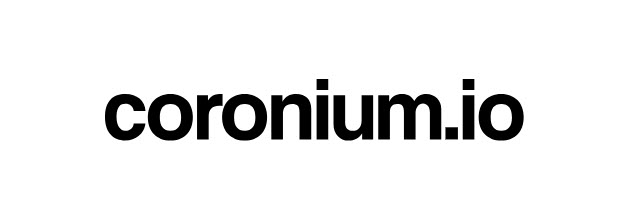
Best for: Users who need guaranteed dedicated devices and maximum trust scores
If you need the absolute highest quality 4G proxies and don't mind paying for it, Coronium.io offers something most providers can't match: Premium mobile proxies with dedicated devices providing raw 4G IPs only, real carrier IPs, and 95%+ trust scores, perfect for data collection, ad verification, multi-accounting, and avoiding blocks.
What "Dedicated Devices" Actually Means
Unlike shared proxy pools, Coronium's mobile proxies use dedicated physical modems, ensuring you're the only user of your assigned IP. This is massive for sensitive operations where IP reputation is critical, like managing high-value social media accounts or accessing platforms with strict security measures.
Real 4G/5G/LTE devices with authentic carrier IPs offer maximum trust at 95-99% and reliable performance. That trust score is the highest you'll find, approaching the level of actual mobile users.
Unique Service Features
Coronium offers 2 free modem replacements per 24h, addressing one of the biggest pain points with hardware-based proxies, when equipment fails, you're not left hanging. Coronium provides 24/7 support, which is crucial when you're paying premium prices.
The Semi-Static IP Advantage
Coronium's mobile proxies provide semi-static IPs that naturally change every 12-24 hours, just like real users' devices, making them perfect for crypto exchanges, social accounts, and other trusted applications. This mimics natural user behavior better than frequent rotation or completely static IPs.
Premium Pricing for Premium Service
Coronium isn't trying to compete on price, they're competing on quality. Expect to pay significantly more than budget providers, but you're getting dedicated hardware, exceptional trust scores, and white-glove service. For businesses where proxy quality directly impacts revenue, this investment makes sense.
Pros:
95%+ IP trust scores (highest available)
Dedicated physical modems (no sharing)
Real carrier IPs from major providers
2 free modem replacements daily
24/7 premium support
Semi-static IPs mimic natural behavior
10+ countries available
Cons:
Premium pricing (not for budget-conscious users)
Smaller network than mass-market providers
Overkill for simple use cases
How to Choose the Right 4G Proxy Provider for Your Needs
Now that you've seen the options, let's talk about matching the right provider to your specific situation.
Match Your Use Case to the Right Provider
For Social Media Management: TheSocialProxy or Proxy-Cheap give you the best bang for your buck. Both handle multiple accounts well, but TheSocialProxy edges ahead if you're managing 20+ accounts.
For Web Scraping at Scale: Decodo's speed and success rate make it ideal for high-volume data collection. That sub-0.8s response time adds up when you're making thousands of requests.
For Budget-Conscious Operations: Proxy-Cheap or AnyIP offer solid performance without premium pricing. AnyIP's pay-as-you-go model is especially good for variable workloads.
For Maximum Security/Trust: Coronium.io is the only real choice if you need dedicated hardware and 95%+ trust scores. Worth the premium for high-stakes operations.
Consider Your Geographic Requirements
For mobile residential proxies, the best IPs come from major carriers worldwide, from Sprint in the US, Vodafone in Germany, and Reliance Jio in India. Make sure your provider covers the regions you need to target.
If you only need US and EU coverage, Proxy-Cheap's focused approach works fine. Need global reach? Decodo's 160+ locations or AnyIP's growing network make more sense.
Bandwidth and Traffic Considerations
The cost of 4g proxies can vary from 2 to 10 dollars per day depending on the country, type and volume of traffic. If you're running bandwidth-intensive operations, unlimited plans from Proxy-Cheap or TheSocialProxy prevent surprise bills.
For lighter usage, AnyIP's per-GB pricing might save you money. Do the math based on your actual needs, don't pay for unlimited if you're only using 10GB monthly.
Common Questions About Using 4G Proxies
Can 4G Proxies Really Prevent Bans?
Short answer: Yes, but they're not magic. No proxy can guarantee a completely block-free experience, but high-quality mobile proxies are widely considered to be the best way to reduce blocks, bans, detection, and human-verification requests, essentially eliminating the risk of IP-related bans.
Your behavior matters too. Even the best 4G proxy won't save you if you're hammering a website with inhuman request patterns or violating rate limits. Use them intelligently.
How Fast Are 4G Proxies Compared to Datacenter Proxies?
With access to 4G networks, mobile proxies benefit from high speeds and low latency, which both increases the volume of data that can be transmitted and expands the range of applications of your proxy.
Modern 4G networks are plenty fast for most use cases—we're talking 10-50 Mbps typically, with 5G reaching 100+ Mbps. That's more than sufficient for web scraping, social media automation, and most data collection tasks.
How Many Social Media Accounts Can I Run on One 4G Proxy?
For Instagram/Facebook/TikTok/Twitter accounts, providers suggest running 5-8 accounts on one proxy port. Some recommend keeping it between 5 and 10 at a time.
Push beyond that and you risk triggering platform algorithms. Better to spread accounts across multiple proxies than overload a single IP.
Are 4G Proxies Legal to Use?
Yes, it is generally legal to buy mobile proxies as they are legitimate tools used for various purposes, including improving privacy, security, and accessing geo-restricted content.
Legality depends on what you do with them, not the proxies themselves. Using them to scrape public data or manage your own accounts? Perfectly fine. Using them to hack into accounts or conduct fraud? Obviously illegal. Use common sense.
What's the Difference Between 4G and Residential Proxies?
The difference between 4G and residential proxy is that once you send a request through a mobile proxy, the destination web server will see a mobile 4G carrier IP address, while residential proxies show home ISP addresses.
4G proxies are from mobile carriers, while residential proxies originate from home ISPs. Mobile IPs generally have higher trust scores because they're shared by many users and come from established mobile networks.
Do I Need 5G Proxies or Will 4G Work?
The key distinction between 3G, 4G, LTE, and 5G mobile proxies is their speed, as we move from 3G to 5G, internet connections become much faster and more dependable.
For most users, 4G is completely adequate. 4G accounted for 60% of all mobile internet traffic in 2022 , so it's the standard most platforms expect. Save the 5G premium for when you actually need that extra speed.
Making Your Final Decision
Here's my honest take after testing all these providers: there's no single "best" option, it depends entirely on your specific needs and budget.
Start with Proxy-Cheap if you're new to 4G proxies or budget-conscious. The free trial and affordable pricing make it easy to test without commitment.
Level up to Decodo when you need better performance, global coverage, or advanced targeting features. The speed and success rate improvements justify the higher cost.
Choose TheSocialProxy if social media is your primary focus and you're managing multiple accounts. The specialization pays off in reduced bans.
Go with AnyIP when you want flexibility and global reach with pay-as-you-go pricing. Great for variable workloads or international targeting.
Invest in Coronium.io only when proxy quality directly impacts your revenue and you need the highest trust scores possible. The dedicated hardware makes a difference for sensitive operations.
Remember, the best 4G proxy is the one that actually solves your specific problem without breaking your budget. Start with one of these five, test thoroughly, and scale up as needed. Your online activities will thank you, and so will your bank account.
FAQ: Everything Else You Need to Know About 4G Proxies
What exactly is a 4G proxy?+
A 4G proxy server utilizes mobile IP addresses or redirects traffic from mobile devices connected to specific mobile carriers, giving users a strong layer of anonymity online and high IP trust. These proxies route your internet connection through actual mobile devices on 4G networks, making your traffic appear as legitimate mobile users.
Can I use 4G proxies on my phone?+
Yes, you can use mobile proxies on a phone—while most providers do not offer dedicated mobile apps, you can configure your device manually or use a compatible third-party proxy client to route traffic through mobile IPs. Most providers offer straightforward setup guides for both iOS and Android.
How much bandwidth do 4G proxies typically offer?+
Many providers offer unlimited bandwidth, but this varies. Proxy-Cheap mobile proxies offer unlimited bandwidth, unlimited data, and unlimited traffic, while premium services like Oxylabs charge per gigabyte. Check your provider's specific terms—"unlimited" sometimes has fair usage policies attached.
Are free 4G proxies worth using?+
Using free mobile proxies that mimic real internet connections provided by mobile networks might seem great, but they will most probably fail to ensure the needed level of privacy, security, and protection, whereas paid mobile 3G/4G/5G/LTE proxies come from reliable providers and stand out due to their speed and stability. Free proxies are typically slow, unreliable, and potentially compromised. Not worth the risk.
What's IP rotation and why does it matter?+
Mobile infrastructure is designed to handle frequent IP changes, which makes mobile proxies an ideal candidate for both manual and automatic IP rotations. Rotation prevents websites from tracking your activity patterns and reduces the chance of bans. Most providers offer rotation schedules from seconds to hours, or on-demand.
How long does it take to set up 4G proxies?+
Most proxies are set up within an hour after payment is received, though in some very rare cases, it can take up to 48 hours. Setup complexity varies—some providers offer instant activation with simple credentials, while others require configuration through dashboards or APIs.
What protocols do 4G proxies support?+
US-based 4G LTE and 5G proxies with HTTP(S) and SOCKS5 support, and unlimited concurrency. SOCKS5 is generally more versatile, supporting any type of traffic, while HTTP(S) works well for web-based applications.
Will 4G proxies work for streaming services?+
Yes, 4G proxies work well for accessing geo-restricted streaming content because they use legitimate mobile IPs that streaming services trust. However, some providers specifically prohibit streaming in their terms of service, so check before purchasing if this is your primary use case.

Precios claros, transparentes y sin costes ocultos.
Sin compromiso, precios para ayudarte a aumentar tu prospección.
Créditos(opcional)
No necesitas créditos si solo quieres enviar emails o hacer acciones en LinkedIn
Se pueden utilizar para:
Buscar Emails
Acción IA
Buscar Números
Verificar Emails
€19por mes
1,000
5,000
10,000
50,000
100,000
1,000 Emails encontrados
1,000 Acciones IA
20 Números
4,000 Verificaciones
€19por mes
Descubre otros artículos que te pueden interesar!
Ver todos los artículosProspección B2B
Publicado el 26 jun 2025
Clearbit vs Cognism: características comunes y diferencias
 Niels Co-founder
Niels Co-founderLeer más
Prospección B2B
Publicado el 30 jun 2025
Zopto vs Waalaxy: Comparación de herramientas de automatización de LinkedIn
 Niels Co-founder
Niels Co-founderLeer más
Software
Publicado el 24 jun 2025
PhantomBuster vs Waalaxy: automatización B2B para dominar la prospección en 2025
 Niels Co-founder
Niels Co-founderLeer más
Software
Publicado el 6 jul 2025
Kaspr vs ZoomInfo vs Emelia: ¿quién dominará la prospección B2B en 2025?
 Niels Co-founder
Niels Co-founderLeer más
Software
Publicado el 30 jun 2025
Comparación entre Snov.io y Waalaxy para la prospección B2B
 Mathieu Co-founder
Mathieu Co-founderLeer más
Software
Publicado el 30 jun 2025
Salesflow vs Waalaxy: La batalla definitiva de 2025
 Niels Co-founder
Niels Co-founderLeer más
Enlaces útiles
HubCold-email: Guía CompletaEntregabilidad: Guía completaAlternativa a LemlistAPISolicitar una demoPrograma de afiliadosFind emailMade with ❤ for Growth Marketers by Growth Marketers
Copyright © 2026 Emelia All Rights Reserved
